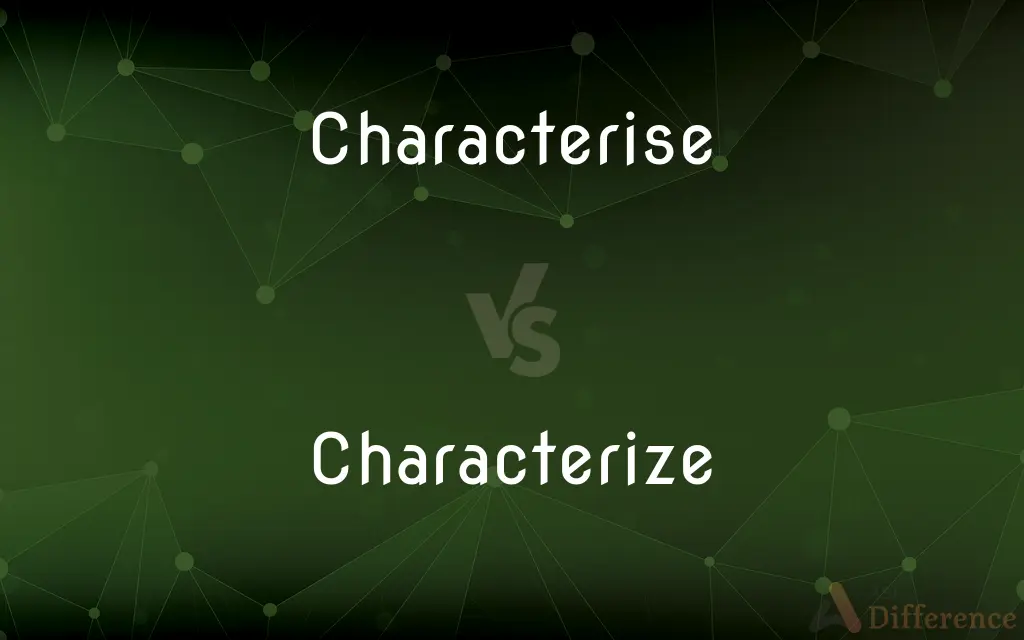Characterise vs. Characterize — What's the Difference?
Edited by Tayyaba Rehman — By Fiza Rafique — Updated on April 27, 2024
"Characterise" is the British English spelling, emphasizing descriptive analysis, whereas "characterize" is preferred in American English for similar uses.

Difference Between Characterise and Characterize
Table of Contents
ADVERTISEMENT
Key Differences
Characterise is commonly used in British English to describe the distinctive qualities or features of someone or something. Whereas, characterize serves the same purpose in American English.
Characterise often appears in UK publications, academic texts, and general writing. On the other hand, characterize is predominantly found in texts originating from the United States, reflecting the spelling conventions there.
The usage of characterise aligns with other British spellings that retain 's' where American English uses 'z', such as in "realise" vs. "realize". Conversely, characterize aligns with the American preference for 'z', which is seen as more phonetically accurate.
In educational settings in the UK, students are taught to use characterise. Whereas, in the US, students are instructed to use characterize, highlighting a geographical divide in educational standards.
When using software with spell check, characterise might be flagged as incorrect in an American English setting. On the other hand, characterize might be marked incorrect in software set to British English, showing how digital tools adhere to regional spelling norms.
ADVERTISEMENT
Comparison Chart
Preferred Spelling Region
British English
American English
Common in Academic Writing
Yes (UK)
Yes (US)
Associated with Spelling Variants
Realise, optimise
Realize, optimize
Spell Check Response
Correct in UK settings
Correct in US settings
Example Publications
The Guardian, BBC
The New York Times, CNN
Compare with Definitions
Characterise
To describe the qualities of someone or something.
The author used vivid language to characterise the protagonist as cunning and charismatic.
Characterize
To illustrate or represent.
The book characterizes the antagonist as a complex figure.
Characterise
To be a typical feature of.
Intricate storytelling characterises her novels.
Characterize
To sort or classify.
Researchers characterize this material as highly durable.
Characterise
To portray or depict something in a specific way.
The film characterises the hero as a reluctant warrior.
Characterize
To describe the attributes or features of someone or something.
He used detailed descriptions to characterize the landscape.
Characterise
To symbolize or exemplify.
His response characterises the patience he's known for.
Characterize
To embody or represent typical qualities.
Bold colors characterize her artwork.
Characterise
To classify or categorize.
Scientists characterise the new species as a type of amphibian.
Characterize
To signify or denote.
Her approach to problems characterizes her analytical mind.
Characterise
Standard spelling of characterize
Characterize
To describe the qualities or peculiarities of
Characterized the warden as ruthless.
Characterise
Be characteristic of;
What characterizes a Venetian painting?
Characterize
To be a distinctive trait or mark of; distinguish
The rash and high fever that characterize this disease.
A region that is characterized by its dikes and canals.
Characterise
Describe or portray the character or the qualities or peculiarities of;
You can characterize his behavior as that of an egotist
This poem can be characterized as a lament for a dead lover
Characterize
(transitive) To depict someone or something a particular way (often negative).
Characterize
(transitive) To be typical of.
Characterize
(transitive) To determine the characteristics of.
Characterize
To make distinct and recognizable by peculiar marks or traits; to make with distinctive features.
European, Asiatic, Chinese, African, and Grecian faces are Characterized.
Characterize
To engrave or imprint.
Characterize
To indicate the character of; to describe.
Under the name of Tamerlane he intended to characterize King William.
Characterize
To be a characteristic of; to make, or express the character of.
The softness and effeminacy which characterize the men of rank in most countries.
Characterize
To identify the structure or nature of; as, the antibiotic activity in the sample was characterized by HPLC, and proved to be erythromycin.
Characterize
Describe or portray the character or the qualities or peculiarities of;
You can characterize his behavior as that of an egotist
This poem can be characterized as a lament for a dead lover
Characterize
Be characteristic of;
What characterizes a Venetian painting?
Common Curiosities
How can I remember which version to use?
A helpful tip is to associate the 's' in "characterise" with 'Standard British' and the 'z' in "characterize" with 'American zing'.
Which spelling should I use if writing for an international audience?
When writing for an international audience, you can choose either, but it might be preferable to use "characterize" as American English is often used as the standard in international contexts.
What types of texts commonly use "characterise"?
"Characterise" is frequently used in British novels, academic journals, and newspapers such as The Guardian or The Times.
Does the spelling variation affect the meaning of the word?
No, the meaning of "characterise" and "characterize" remains the same, only the spelling varies by regional preference.
Are there any exceptions where a British writer might use "characterize"?
British writers might use "characterize" if they are writing for publications or audiences predominantly using American English.
What types of texts commonly use "characterize"?
"Characterize" is often seen in American novels, academic publications, and media outlets like The New York Times or The Washington Post.
Do both terms have the same pronunciation?
Yes, both "characterise" and "characterize" are pronounced the same way, despite the spelling difference.
How do English learning materials in non-native countries choose between the two?
English learning materials in non-native countries often choose based on the most influential English-speaking culture in the region or the most widely understood variant.
Can using the wrong variation affect my grades in school?
Yes, using American spelling in a British school or vice versa may be marked as a spelling error, potentially affecting grades.
Is one form more modern than the other?
No, both forms are modern and correct; the choice between them depends solely on regional spelling conventions.
Does the use of "characterise" or "characterize" vary in academic writing?
Yes, the use varies significantly in academic writing, with scholars adhering to the spelling norms of their respective regions or publication guidelines.
Are there digital tools to help identify and correct the use of these terms?
Yes, most word processors and writing aids offer language settings that can identify and suggest corrections for British or American spellings.
What should non-native English speakers know about these terms?
Non-native speakers should be aware of the regional differences and choose the appropriate version based on the context or location where their English skills will be applied.
How should businesses choose which spelling to use in their communications?
Businesses should consider their target audience and choose the spelling that aligns with the regional preferences of their customers to enhance readability and professionalism.
What is the historical origin of the spelling differences?
The spelling differences arise from a broader divergence between American and British English in the 19th century, where American English often adopted simpler or more phonetic spellings.
Share Your Discovery

Previous Comparison
Trying vs. Try
Next Comparison
Harpsichord vs. CembaloAuthor Spotlight
Written by
Fiza RafiqueFiza Rafique is a skilled content writer at AskDifference.com, where she meticulously refines and enhances written pieces. Drawing from her vast editorial expertise, Fiza ensures clarity, accuracy, and precision in every article. Passionate about language, she continually seeks to elevate the quality of content for readers worldwide.
Edited by
Tayyaba RehmanTayyaba Rehman is a distinguished writer, currently serving as a primary contributor to askdifference.com. As a researcher in semantics and etymology, Tayyaba's passion for the complexity of languages and their distinctions has found a perfect home on the platform. Tayyaba delves into the intricacies of language, distinguishing between commonly confused words and phrases, thereby providing clarity for readers worldwide.
















































